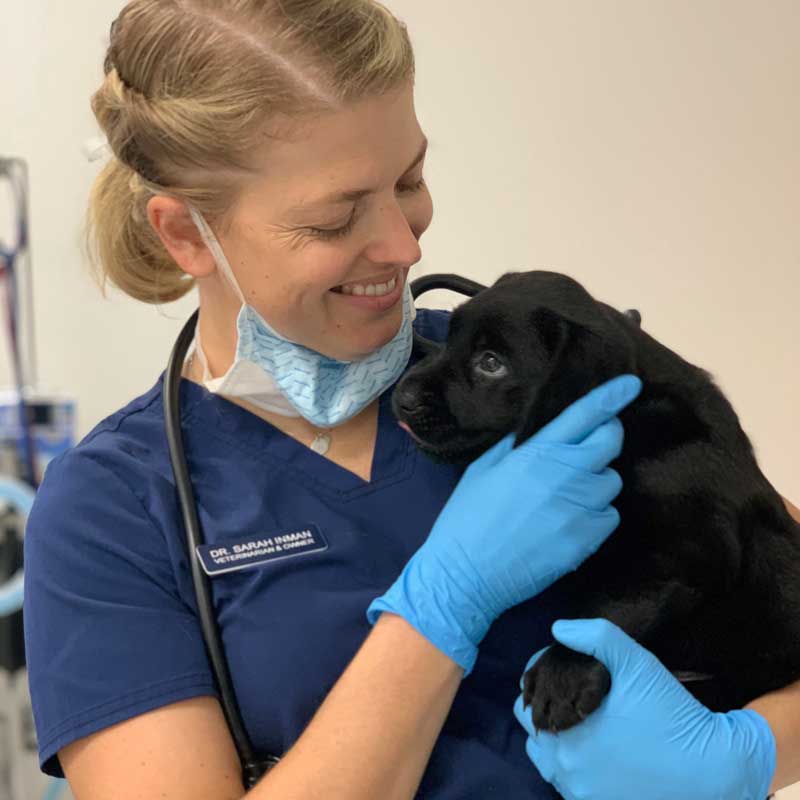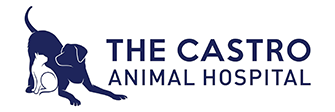Puppy Information
Recommended Puppy Vaccination Schedule
| Weeks of Age | Core Vaccines | Non-Core Vaccines | Parasite Screening, Treatment & Prevention |
| 8 Weeks | 1st DHPPV | Bordetella 1st Canine Influenza (H3H8 & H3N2) |
Flea & Tick Preventative Heartworm Preventative Fecal Test |
| 12 Weeks | 2nd DHPPV 1st Leptospirosis |
2nd Canine Influenza (H3H8 & H3N2) 1st Lyme |
Flea & Tick Preventative Heartworm Preventative |
| 16 Weeks | 3rd DHPPV Rabies 2nd Leptospirosis |
2nd Lyme | Flea & Tick Preventative Heartworm Preventative |
Your puppy is not considered immune to these diseases until 7-10 days after the vaccine series is complete, so please do not take them to any public areas!
DHPPV / DAPPV Vaccination
The parvovirus vaccine is given as a 4-in-1 vaccination standing for Distemper, Hepatitis (Adenovirus), Parainfluenza, and Parvovirus. The first dose is administered as young as six weeks old and is then given in a 2 to 4-week interval until at least the age of 16 weeks old (totaling 3-4 times depending on when the 1st vaccine was given). A booster shot is given one year after the last interval dose, then again every three years.
What is Canine Distemper?
Canine distemper is an extremely contagious viral disease. This disease is closely related to the virus that causes measles, and spreads through the air, attacking the tonsils and lymph nodes. The virus replicates in the body and attacks the gastrointestinal, respiratory, urogenital, and nervous systems. Unfortunately, there is no known cure for canine distemper; however, some dogs can recover fully after receiving treatment for symptoms and constant care.
After a dog has fully recovered, she will no longer carry or spread the disease. Symptoms can include; High fever, runny nose, eye discharge, red eyes, lethargy, lack of appetite, coughing, vomiting, diarrhea, seizures, and paralysis. Some dogs also experience thickening or enlargement of their footpads.
What is Adenovirus & Hepatitis?
The canine adenovirus type 1 causes canine hepatitis. Dogs who suffer from this virus experience swelling and cell damage in the liver, which can result in hemorrhage and death. This virus can be contracted through the feces and urine of infected dogs. Symptoms include pain in the abdomen, abdominal distension, lack of appetite, pale color, lethargy, fever, and tonsillitis. Fluid swelling in the corneas often results in the appearance of the dog having blue eyes. Death within one to two days is common in more severe cases. However, if a dog survives the first few days, it can result in a full recovery and future immunity to the virus.
The canine adenovirus type 2 is a relative of the hepatitis virus and is one of the causes of kennel cough. Once your dog receives the vaccine for this virus, the severity of it is limited, so the chance of death is unlikely. Symptoms include the development of a hacking cough a week after exposure, inflammation in the airways, white foamy discharge after coughing, pink eye, inflamed nasal passages, and nasal discharge.
What is Parainfluenza?
Parainfluenza, or canine influenza is highly contagious. Symptoms include dry cough, fever, wheezing, difficulty breathing, runny nose, sneezing, pneumonia, reduced appetite, lethargy, eye inflammation, runny eyes, and conjunctivitis. Most dogs recover on their own, but most vets like to treat them immediately using antibiotics and antiviral drugs since it is so contagious. A cough suppressant and additional fluids may also be given to your dog.
What is Parvovirus?
Canine parvovirus (parvo) is extremely contagious and is contracted through the feces of an infected dog & can live in the environment for up to 3 days. Unfortunately, parvo often kills young puppies with poorly developed immune systems. Around 91% of untreated parvo cases result in death. The parvo vaccine is the only way to prevent a dog from contracting this virus. Parvo cannot be spread from dogs to humans. Dogs that have contracted parvo generally show symptoms within three to ten days. The most commonly seen symptoms of parvo include secondary infections, dehydration, lethargy, diarrhea, vomiting, endotoxemia, shock, and eventually death. If a dog has a confirmed case of parvo they can infect neighborhood dogs with their feces and through soil that has come in contact with their feces. Dogs can still shed the parvovirus in their feces once they have recovered from the virus. The vaccine can take up to two weeks to take effect and fully protect a dog from it.
Rabies Vaccination
The rabies vaccine is given at 16 weeks of age & is compulsory for all dogs living in San Francisco. Rabies is a viral disease that can be carried by many mammals. This is one of the few zoonotic diseases (diseases humans can catch from their dogs). Rabies is commonly transmitted through a bite from an infected mammal. Rabies causes acute encephalitis and eventually infects the entire nervous system causing death. Rabies can be stopped if it is treated before symptoms occur. Once symptoms appear it becomes a fatal disease. Rabies can take anywhere from two to 12 weeks to present itself; however, some cases can take much longer.
What is Leptospirosis?
Leptospirosis is a bacterial infection caused by the pathogen Leptospira. Leptospira, or Leptospirosis, can affect canines and humans and can result in death in some cases. Dogs become infected with Leptospires (an organism that thrives in water) by consuming urine-contaminated water or contact with infected urine. Leptospires use a dog’s kidneys to breed and continue living out their life cycle. Symptoms include fever, vomiting, depression, loss of appetite, generalized pain, and conjunctivitis. Later symptoms include a drop in temperature, increased thirst, change in urine color, jaundice, frequent urination, dehydration, difficulty breathing, muscular tremors, vomiting, and bloody feces. Antibiotics can help shorten the length of the disease and reduce potential organ damage if caught in the early stages. In more severe cases, kidney filtration and blood transfusion may be necessary. About 10% of Leptospirosis cases result in death from secondary complications.
Information about Non-Core Puppy Vaccinations
What is Bordatella?
Bordatella (Kennel cough) is caused by bacteria and is spread through airborne contaminants. Bordatella is spread through exposure to infected dogs or the transfer of bacteria in food bowls, cages, and water bowls. As bacteria multiply, it destroys the lining of the dog’s trachea, which results in a high-pitched cough. Dogs may also gag and wretch as they cough. Symptoms include fever, sneezing, nasal discharge, loss of appetite, and depression. When symptoms present, the dog should be given antibiotics and a cough suppressant. Untreated Bordatella can lead to pneumonia and secondary bacterial infection.
What is Canine Influenza?
Canine influenza is caused by the canine influenza virus (CIV). It is highly contagious and easily spread from infected dogs to other dogs by direct contact, nasal secretions (through barking, coughing, or sneezing), contaminated objects (kennel surfaces, food, and water bowls, collars, and leashes), and people moving between infected and uninfected dogs. Canine influenza can occur year-round & can present as lethargy, ocular or nasal discharge, fever, dehydration, inappetence, vomiting, or diarrhea & can progress to pneumonia. CIV can be life-threatening in immunocompromised patients, the very young & the very old.
What is Lyme Disease?
Lyme disease is spread through a tick bite. Symptoms don’t always appear for all dogs with Lyme disease although some will show swollen lymph nodes or lameness. If your dog does display symptoms of Lyme disease be sure to check her over for any ticks that may still be present. Untreated Lyme disease can cause extreme inflammation in your dog’s nervous system, heart, and kidneys and potentially lead to death. Vets test for Lyme disease by taking blood samples and if a dog is positive for Lyme disease, early treatment with Doxycycline is prescribed. If a more advanced stage of Lyme disease is suspected antibiotic treatment will continue for longer and nonsteroidal anti-inflammatory drugs may be prescribed.
Side Effects And Risks Associated With Dog Vaccinations
The benefits of vaccinations far outweigh any risks. Adverse reactions to dog vaccines are rare. However, As with any medication or immunization protocol, vaccinations can cause some side effects. We do recommend that you have your puppy or dog vaccinated at a time when you can monitor them after the vaccination.
If your dog does experience any reaction to vaccinations, symptoms may include:
- Fever
- Sluggishness
- Loss of appetite
- Facial or paw swelling and/or hives
- Vomiting
- Diarrhea
- Pain or swelling around the injection site
- Collapse, difficulty breathing, and seizures (anaphylactic shock)
If your dog shows any of the above symptoms after receiving a vaccination, please call our office or an emergency veterinary clinic to discuss the severity and possibly receive treatment.
Additional Information
Heartworm Prevention
Heartworms are parasites in which worms lodge in the heart and vessels of the lung and are spread by mosquitoes. We recommend starting preventative tablets at the age of 8 weeks and for the dog’s lifetime. Testing is recommended annually for the disease.
Fleas & Tick Prevention
Fleas can be a nuisance and health hazard to you and your pet. Some of the products carried at Polk Street Animal Hospital are:
Revolution Plus Puppy: Topical insecticide applied once monthly, kills fleas, ticks & heartworms
Nexgard: oral insecticide given once monthly, kills fleas and ticks within 12 hours.
Bravecto: oral insecticide given once every 3 months, kills fleas and ticks within 12 hours. (only used when >6 months)
The Fecal Exam
There are many intestinal parasites your puppy can carry. Please bring in a fecal sample for us to evaluate it with special testing. Some parasites are transmissible to humans (zoonotic) so this is important for the health of your pet and the protection of your family.
Diet
From the time of weaning until 1 year of age, puppies should be fed a main brand of puppy food such as Royal Canin, Science Diet, Iams, Eukanuba, Nutro, Pedigree, or Purina. Ideally, train your puppy to be meal-fed rather than always leaving food out. This will help control problems that could develop later in life.
?For small breed puppies, we recommend feeding frequent small meals until they are about 16 weeks old to prevent problems with low blood sugars.
?For large breed puppies such as Great Danes, Dobermans, Golden Retrievers, Rottweilers, Labradors, and many other large breed canines, feed a puppy food designated for large breeds. This special puppy food has fewer calories per cup than regular puppy food. It has been scientifically proven that these foods can significantly reduce the chances of some orthopedic illnesses.
Spay & Neuter
We recommend your puppy be spayed at age 6-8 months, or neutered around 1 year of age. Spaying your female puppy before her first heat will critically reduce the chances she will develop mammary cancer as an adult dog. Neutering your male puppy will reduce problems of prostatitis and testicular cancers seen in adult male dogs. There are multiple different studies currently underway evaluating the timing of spay/neuter. Please talk with the veterinarian if you have any questions.
Puppy Training
We recommend puppy-training courses for every puppy and its owner. Normally, this is started after 12 weeks of age, once two sets of vaccines have already been given.

